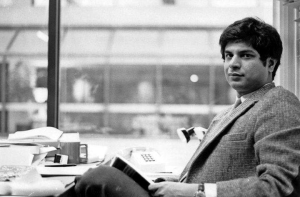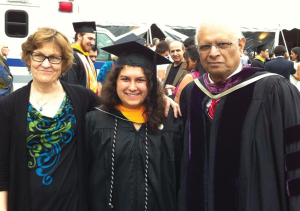
Economics professor Adhip Chaudhuri in his Intercultural Center office in the early 1980s. Chaudhuri, who taught at Georgetown for 34 years, died at 62 after a three-year battle with cancer Jan. 13.
A professor at Georgetown for 34 years, Adhip Chaudhuri was, in many senses, a lifelong student.
Chaudhuri, who retired last year, died Jan. 13 after a three-year battle with lung cancer. He was 62 years old.
While his field was economics, Chaudhuri’s currency was knowledge. It was a trait he inherited from his parents, a chemist and housewife, and one he would pass on to his two children, Maya (SFS ’13) and Neal (COL ’16).
Throughout his Georgetown career, Chaudhuri inspired students, friends and colleagues alike with his zeal for international economics and natural aptitude for making learning fun.
“He would always come home and tell us which class he liked better that day, the morning or afternoon section, based on how they responded to his jokes,” Maya said.
As children, Neal and Maya were often forced to memorize maps, countries and flags as well as plants — an interest Chaudhuri developed while following around the gardener at his boarding school in Kolkata, India.
“He was always slightly disappointed that my sister and I weren’t as obsessed with plants as he was,” Neal said. “I think part of it was the Latin names and part of it was the natural beauty.”
A Man for Others
Born in 1951 in Ghazipur, in the Indian state of Uttar Pradesh, Chaudhuri was the youngest of four siblings. After graduating at the top of his class from St. Stephen’s College at Delhi University and then the Delhi School of Economics, Chaudhuri immigrated to the United States in 1972.
Chaudhuri spent his days as a doctoral candidate at Columbia University, applying the social justice philosophy of John Rawls to economics in his thesis. He also took time to absorb American culture, frequenting Tom’s Diner, which would later be featured on the television show “Seinfeld” and adopting the New York Giants and New York Yankees as his own teams.
Georgetown, where he started teaching in 1979, gave Chaudhuri the opportunity to apply his economic theories of social justice in a tangible manner.
Chaudhuri was the first economics professor to incorporate community based learning, allowing students in his “International Trade” class to work with the Kalmanovitz Initiative for Labor and the Working Poor as a fourth credit option.
“At a lot of schools you really can’t bring things like justice or social welfare in the department. Georgetown allowed him to do that,” Maya said.
Clearly, Chaudhuri led by example. Maya, who was heavily involved with the Center for Social Justice during her time at Georgetown, is now working with the Jesuit Volunteer Corps, while Neal is a leader with the university’s ESCAPE retreat program.
One of Chaudhuri’s proudest moments was when he had the opportunity to bring Nobel Prize-winning economist Amartya Sen to campus to be honored for incorporating ethics into his work.
“He didn’t always give off his social justice. You could tell he was passionate about it, but he didn’t shove it down your throat,” Neal said of his father.
Community in Diversity
Chaudhuri’s love of economics was not bound by the front gates. Through Georgetown, Chaudhuri had the opportunity to conduct research and lecture in Austria, Vietnam and Qatar. It was this final post, at the School of Foreign Service campus in Doha, that would be the most formative for the professor.
The same examples and jokes he used at Georgetown came out in even stronger force in the smaller, more intimate Doha setting.
Kim Fernandes (SFS-Q ’11), a student of Chaudhuri’s in Qatar, relished the opportunity to engage with the professor, whom she cited as part of her inspiration for pursuing graduate studies in education policy.
“He made so many jokes in class, God bless him,” Fernandes recalled. “He’s honestly just an excellent professor. It mattered so much that we were able to talk to him not just about class but things like our research interests as well.”
Chaudhuri was well-loved at the university, twice receiving SFS-Q’s teacher of the year award.
Cura Personalis
From memorizing box scores and baseball statistics for his favorite teams to spending hours solving crossword puzzles in The Washington Post — always in pen — Chaudhuri pursued all facets of his life with the same intellectual fervor that he brought to the classroom.
When not debating the benefits of the Ricardian model with students, Chaudhuri was a key player in a long-standing bridge club consisting of professors across the history and economics departments.
Joining the club soon after his arrival at Georgetown in 1979, Chaudhuri spent many a day first in the seminar room of Nevils where the economics department was then housed and later in Intercultural Center classrooms with members of the club, among whom he was noted for his incredible wit.

Adhip Chaudhuri, right, with his daughter Maya Chaudhuri (SFS ’13), center, and Maya’s mother Margaret McBride, right. Chaudhuri taught at the university for 34 years before his death in January.
“He was so inventive among the types of jokes he would say. He would make analogies to sports games and would use metaphors like ‘touchdown’ or ‘getting on the scoreboard’ to describe the bridge game,” said David Goldfrank, director of the Medieval Studies program and longtime bridge club member.
Known as the “Wise Man of the East” among members, it was in this group that Chaudhuri would confide updates of his illness and find solace, joining in for the occasional bridge game until this past summer.
Chaudhuri also developed strong ties within the Jesuit community, where he found men who shared his curiosity for learning and passion for interfaith dialogue.
“He loved talking about religion, though he didn’t necessarily consider himself a Christian,” Maya said. “Georgetown priests are so invested in interreligious dialogue. It was something he wouldn’t have gotten at any other university.”
Though raised in the Hindu tradition, Chaudhuri grew close with several Jesuits, including Fr. James Walsh, S.J., Fr. Leo Lefebure, S.J., and Fr. James Reddington, S.J., the last of whom presided over Chaudhuri’s wedding in Dahlgren Chapel and the baptisms of Maya and Neal, whose mother, Margaret McBride, is Catholic.
A constant theme throughout Chaudhuri’s life was the sanctity of knowledge, teaching his children that it was unacceptable to leave a book on the floor. At the same time, knowledge also represented a source of fun.
Maya and Neal recalled Safeway trips extended by their father’s histories of the products on nearly every aisle and carpool rides, during which an afternoon snack was awarded only after the siblings and their friends could identify, in both English and Latin, at least three plants the car passed on its way home.
Chaudhuri is survived by his wife, Joanne Kinney Smyth, his children, Maya and Neal, his former wives McBride and Una Chaudhuri, and two siblings.
According to one Chaudhuri’s closest friends, Amit Shah, his passion for teaching never waned, even when cancer began to consume his life.
“Right until the very end when he couldn’t stand up to teach, he would say to me, ‘I have to sit down and do this,’ but he did it because he loved doing it,” Shah said. “He could’ve quit a while ago, but he loved having people respond to the concepts and issues in such a real way.”














